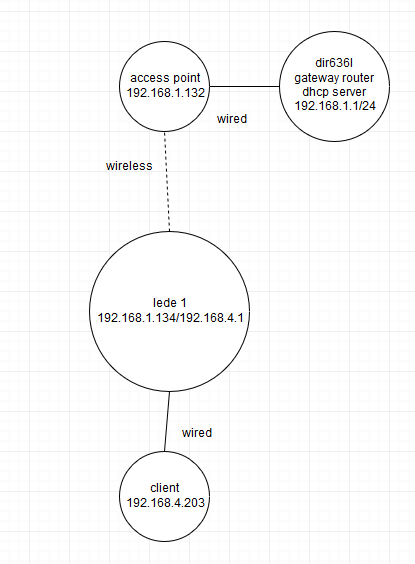Hi,
I have the following setup:
Goal: define static route to 192.168.4.0/24 subnet, offload nat to/from clients in 192.168.4.0/24 on LEDE router to dir636l gateway router.
What I managed to achieve:
- Client 192.168.4.203 can access internet.
- Client 192.168.4.203 can access 192.168.1.1 but none of the other hosts on 192.168.1.0/24
- Lede router on 192.168.4.1 can ping client on 192.168.4.203.
What I did:
- On dir636l I created static route as follows:
# ip route XXX via XXX dev eth2.2 XXX via XXX dev eth2.2 192.168.4.0/24 via 192.168.1.134 dev br0 metric 1 192.168.1.0/24 dev br0 src 192.168.1.1 XXX/22 dev eth2.2 src XXX default via XXX dev eth2.2
- On dir636l I added a rule in nat table for 192.168.4.0/24 for nat:
iptables -t nat -A POSTROUTING -j MASQ_POST -s 192.168.4.0/24
- On lede router I have following lan and wan config:
config interface 'lan' option type 'bridge' option ifname 'eth1.1 eth0.1' option proto 'static' option ipaddr '192.168.4.1' option gateway '192.168.1.1' option dns '192.168.1.1' option netmask '255.255.255.0' option ip6assign '60' config interface 'wan' option proto 'static' option ipaddr '192.168.1.134' option netmask '255.255.255.0' option gateway '192.168.1.1'
- On lede router I changed the following firewall rules (the 5ghz wlan interface is bridged to wan)
config zone option name wan list network 'wan' list network 'wan6' option input ACCEPT option output ACCEPT option forward ACCEPT option masq 0 option mtu_fix 1
- I can confirm that NAT is done on dir636l by looking at /proc/net/nf_conntrack:
On lede router
ipv4 2 icmp 1 29 src=192.168.4.203 dst=172.217.3.206 type=8 code=0 id=1 packets=65 bytes=3900 src=172.217.3.206 dst=192.168.4.203 type=0 code=0 id=1 packets=65 bytes=3900 mark=0 zone=0 use=2
On dir636l
ipv4 2 icmp 1 29 src=192.168.4.203 dst=172.217.3.206 type=8 code=0 id=1 src=172.217.3.206 dst=my.public.ip type=0 code=0 id=1 mark=0 use=2
Again my issue right now is
- 192.168.4.203 cannot see other hosts on 192.168.1.0/24 except 192.168.1.1 the gateway router
I hope this also serves as a reference for people looking to do subnet static routing and NAT offload.
Thanks for your help!
